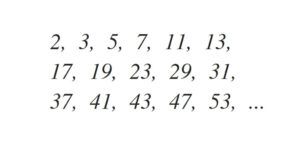Prime numbers are those with only two divisors, itself and 1. There are infinities and the smallest is 2.
For example, each number that appears in the following list is prime:

How many prime numbers are there?
The quantity is infinite and it was Euclid of Alexandria who proved it. Until today, nobody has found a formula to calculate all prime numbers.
What is the largest prime number known?
The largest known to humanity has more than 22 million digits.
The following explains how they have been calculated and their relationship to the perfect numbers:
Exercices
1. Prime numbers between 1 and 50:
Quiz-summary
0 of 1 questions completed
Questions:
- 1
Information
Ejercicios de Números Primos
You have already completed the quiz before. Hence you can not start it again.
Quiz is loading...
You must sign in or sign up to start the quiz.
You have to finish following quiz, to start this quiz:
Results
Your time:
Time has elapsed
You have reached 0 of 0 points, (0)
| Average score |
|
| Your score |
|
Categories
- divisibilidad 0%
- 1
- Answered
- Review
-
Question 1 of 1
1. Question
-
Prime numbers between 1 and 50 →
(2), (3), (5), (7), (11), (13), (17), (19), (23), (29), (31), (37), (41), (43) y (47)
Correct
Incorrect
-
2. Select the prime numbers:
Quiz-summary
0 of 1 questions completed
Questions:
- 1
Information
Ejercicios de Números Primos
You have already completed the quiz before. Hence you can not start it again.
Quiz is loading...
You must sign in or sign up to start the quiz.
You have to finish following quiz, to start this quiz:
Results
Your time:
Time has elapsed
You have reached 0 of 0 points, (0)
| Average score |
|
| Your score |
|
Categories
- divisibilidad 0%
- 1
- Answered
- Review
-
Question 1 of 1
1. Question
Correct
Incorrect

0 Comments